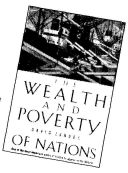 The Wealth and Poverty of Nations
The Wealth and Poverty of NationsDavid Landes
Little Brown £10.99
Reviews, Socialist Review, No.233, September 1999.
Copyright © Socialist Review.
Copied with thanks from the Socialist Review Archive at http://www.lpi.org.uk.
Marked up byEinde O’Callaghan for the Marxists’ Internet Archive.
 The Wealth and Poverty of Nations
The Wealth and Poverty of Nations
David Landes
Little Brown £10.99
This book has received considerable publicity since it came out in hardback. It attempts to deal with an important topic – the enormous disparities between output per head in the advanced industrial countries and the Third World. It provides a mass of empirical material about developments in technology over the centuries.
Landes explains the disparities in terms of geographical location and the impetus which different ‘cultures’ provide to technical innovation. His arguments on both accounts fail.
His main geographic explanation is that ‘the rich countries lie in the temperate zones, the poor countries in the tropics and semi-tropics’. Hot climates, he claims, discourage people from exerting themselves voluntarily, so that high levels of productivity are only likely where ‘slavery makes other people do the hard work. It is no accident that slave labour has historically been associated with tropical and semi-tropical climates.’
His claims are full of holes. There are many economically impoverished regions with temperate climates: the valleys of Mexico or inland Peru and Ecuador are considerably more ‘temperate’ than some economically more advanced regions elsewhere in the world. Today there are enormous, if localised, centres of industry in sweltering cities like Bombay and Calcutta. If you go back only 1,000 years the ‘advanced’ regions of the world were in relatively hot areas like Mesopotamia, the Nile Valley, southern China and Yucatan, while north western Europe was poor, backward and almost cityless. The argument on slavery does not fit either. It was central to the economies of temperate Greece and Rome, but marginal to the economies of hotter Egypt or Mesopotamia.
The argument about ‘cultures’ is equally flawed. Of course, some cultures have placed more stress upon the expansion of economic activity than others. Landes is quite right to note that the Counter-reformation Catholic orthodoxy in late 16th century southern Europe or neo-Confucian orthodoxy in 11th century China discouraged technical innovation and economic expansion. But that leaves completely unexplained where those orthodoxies came from and why they became dominant in some places and not others.
Both faced challenges in a way that Landes virtually ignores. The Counter-reformation in southern Europe was the other side of the stagnation of the Spanish and Italian economies in the 16th century: the bourgeoisie simply was not strong enough to establish a new social and ideological order, as in Holland and England, or even to gain an institutionalised base for itself inside the existing order, as in absolutist France.
In the Chinese case there had been massive economic growth, large scale spread of market relations and more technical innovation than anywhere else in the world from the 8th to the 11th centuries. There was also a tendency for the merchant and artisan classes to adopt values very different to those of the neo-Confucianism of the state bureaucrats and landed gentry, and even for the new values to influence sections of the ruling class. The economic advance came to a halt because the merchant and artisan classes were not able to mount a successful challenge to the old order. The parasitism of the landowning classes then damaged the rural economy and a weakened empire was conquered piecemeal by non-Chinese peoples from the north. The intrinsic nature of Chinese culture had little to do with the matter.
The ‘culturism’ of Landes’ approach slides easily into the view that there is something about western culture, going right back to supposed ancient Greek and Judaic origins, that makes it intrinsically superior to any other. This fails to see that what we call ‘western culture’ today is very different from the multitude of European cultures that existed a few hundred years ago and is, in fact, a product of the development of capitalism over the last 300 years. This development has now encompassed the whole world and changed values everywhere, so that there is little that is specifically ‘western’ about the values that surround us today. Nor is it true that the origins of these values are to be found only in the west. The seeds of capitalist ideology were to be found in the 9th century Baghdad of the Arabian Nights, the great trading and manufacturing centres of 10th century Sung or 16th century Ming China, even if it was only in 17th and 18th century Holland and Britain that they were first able to grow fully.
Landes’ narrow and unhistorical view leads him to attack anyone who disagrees with his judgements as suffering from ‘political correctness’. This approach also enables Landes to virtually ignore the way in which the development of certain national capitalisms has cramped the development of others. You would not think from his book that the English ruling class, having developed industry and agriculture that was marginally more advanced than that of, say, Ireland or India by the beginning of the 18th century, then used that advance to smash and subordinate such economies to its dictates, bringing about impoverishment and deindustrialisation.
Landes is critical of parts of the dominant neoclassical economic orthodoxy, like the theory of comparative advantage. But despite useful chapters, his own book ends up as apologia for the present world system as it is.
Last updated on 21 December 2009